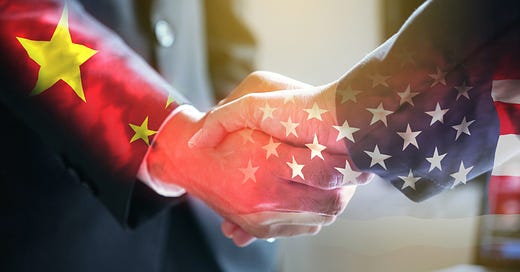Has The US Unwittingly Reunited China And Russia? Part I
The "Heart Of China" Blog with a Point of View
Certainly, President Xi1 would prefer a good relationship with the US and NATO countries. Yet, is he being shunned by the actions of the US government? From the beginning of the Biden administration, the relationship with China has not been what it should.
During his time as Vice President in the Obama Administration, Joe Biden boasted a good relationship with Xi Jinping2. Since the Chinese are a relationship-based culture, they cherish friends and relationships and would never blatantly insult or upset a good friend publicly. On the other hand, the US is a transaction-based culture, friendships can falter from changes of opinion or newly adopted views. Even families fray at the edges from a change of views or differing lifestyles.
Off on the wrong foot
Was the relationship with China not handled diplomatically from the onset of the Biden Administration? A few months after Biden took over the Whitehouse, in mid-March of 2021, a Chinese delegation visited the state of Alaska for diplomatic negotiations. The American hosts did not include working lunches in the arrangements.
Anyone with mere basic knowledge of Chinese customs knows meals are the most important activity when negotiating with the Chinese. This is an important practice in Chinese culture—an expression of civility and respect, an opportunity to connect and strengthen relationship and communications in a more casual arrangement. How is it possible that the US government would not have this information? (See my response to the conundrum)
Recently, a second diplomatic faux pas has been implemented as a diplomatic boycott on the Olympics—games that should opportune countries in coming together in the spirit of the sport, notwithstanding disagreements or differences.
In 1955, Zhou Enlai, the Chinese Premier, called for increased cooperation between countries of Asia and Africa during a conference at Bandung, Indonesia. He invoked the Chinese expression, ”求同存异 (qiú tóng cún yì) Focus on similarities and save the differences,” imploring the attendees to apply diplomacy by promoting a concept of cross-ideology success.
What do we call diplomacy?
The American cultural mindset is alright acting in ways that may shock or catch others off guard. We tell people what we think—often speaking from a highjacked amygdala. Not necessarily a diplomatic practice.
The Merriam-Webster Dictionary describes diplomacy as follows,
1: the art and practice of conducting negotiations between nations
2: skill in handling affairs without arousing hostility : TACT
//handled the awkward situation with diplomacy
The art of diplomacy is not built on an idea of angering and insulting, which may hint at a lack of diplomacy or even gaucheness. Diplomacy is a skill set applied to succeed together and bridge differences, rather than expand the gap of separation. True diplomacy is a skill set that works to bridge differences by adjusting expectations and demands to achieve a win-win outcome.
By not extending friendly hospitality to the Chinese delegation and through boycotting the Beijing Winter Olympics, the United States sends a message to Beijing that it does not see China in friendly terms. But, do the Americans realize this?
Unfortunately, President Biden has not tapped into his once good relationship with Xi Jinping in the interest of the American people, but has, in fact, spit in Xi’s face.
This is a diplomatic failure for the Biden Administration, an administration that has ostracized China. It is something they may find difficult to repair over a short period. The misstep also exposed the present Administration’s lack of basic skill sets to succeed with the emerging China—one country with which we should maintain impeccable relations.
Continued here.
Pronounced as, shee.
Pronounced as, jeen peeng.







